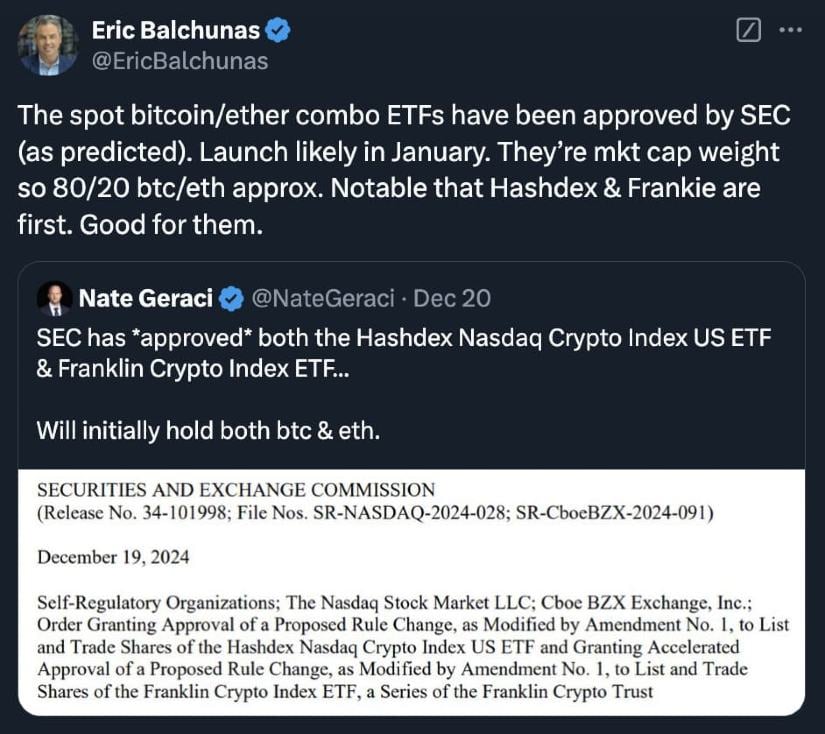SEC Approval of First Dual Bitcoin-Ethereum ETFs Marks Major Step in U.S. Crypto Market Expansion
December 21, 2024
The U.S. Securities and Exchange Commission (SEC) has approved the first-ever exchange-traded funds (ETFs) to offer combined exposure to Bitcoin and Ethereum, breaking new ground for digital asset investment products and potentially charting the course for future multi-asset funds.
The regulatory nod, granted after multiple extensions and delays since June, will allow Nasdaq to list the Hashdex Nasdaq Crypto Index US ETF and Cboe BZX Exchange to list the Franklin Crypto Index ETF. According to industry analysts, both are expected to launch early next year. Unlike previous single-asset crypto ETFs, these funds will hold Bitcoin and Ethereum, the two largest cryptocurrencies by market capitalization, with the initial split anticipated to hover around 80% Bitcoin and 20% Ethereum.
The funds must comply with continued listing requirements, maintain transparency in their portfolio holdings, and adhere to measures to prevent fraud and manipulation. Enhanced surveillance-sharing agreements involving the sharing of trading data among exchanges formed a key part of the regulator’s approval calculus, ensuring market integrity and investor protection.
An Active Crypto ETF Landscape
The approval arrives amid an increasingly active crypto ETF landscape in the United States. BlackRock’s spot Bitcoin ETF, known as IBIT, currently leads the market with about $56 billion in assets under management (AUM) and daily volumes topping $4.4 billion. Fidelity’s FBTC and Grayscale’s GBTC follow closely, each managing around $20 billion in AUM. Recent data from Coinglass indicated net outflows of approximately $671 million on December 19 across major funds, underscoring the fluid nature of investor sentiment.
Still, industry observers say the dual Bitcoin-Ethereum products could attract a new wave of participants. Nate Geraci, president of the ETF Store, noted that financial advisors appreciate diversification, especially in an emerging asset class, and a combined product provides a more balanced gateway into crypto.
Eric Balchunas, a senior ETF analyst at Bloomberg, has projected a likely launch as soon as January, noting that the fund’s holdings will be weighted by free-float market capitalization, aligning them closely with actual market conditions.

Source: X
The SEC’s decision may also reflect a comfort level with cryptocurrency markets now deemed to have “a regulated market of significant size,” often illustrated through correlations with established exchange-traded Bitcoin futures on the Chicago Mercantile Exchange (CME). Surveillance-sharing arrangements, designed to flag suspicious trading patterns and deter manipulation, were central to the regulator’s approval. This approach indicates that as long as products fit established commodity trust standards, more complex multi-asset crypto ETFs might be feasible going forward.
A Solana ETF?
The dual-asset authorization comes on the heels of Grayscale Investments’ recent filing to convert its Solana Trust into a spot ETF, suggesting a broader industry push to expand beyond single-asset offerings. Analysts say the SEC’s latest action hints at a more receptive environment for innovation, potentially paving the way for funds featuring other cryptocurrencies like Litecoin or Hedera Hashgraph (HBAR) in the future.
Both Hashdex and Franklin Templeton’s filings referenced the evolving appetite for digital assets as well as the efficiencies gained by investing through a single regulated product. Observers believe these pioneering ETFs could serve both retail investors and institutions, simplifying entry into crypto markets that once required more complex custodial and security measures.
Search
RECENT PRESS RELEASES
Related Post



